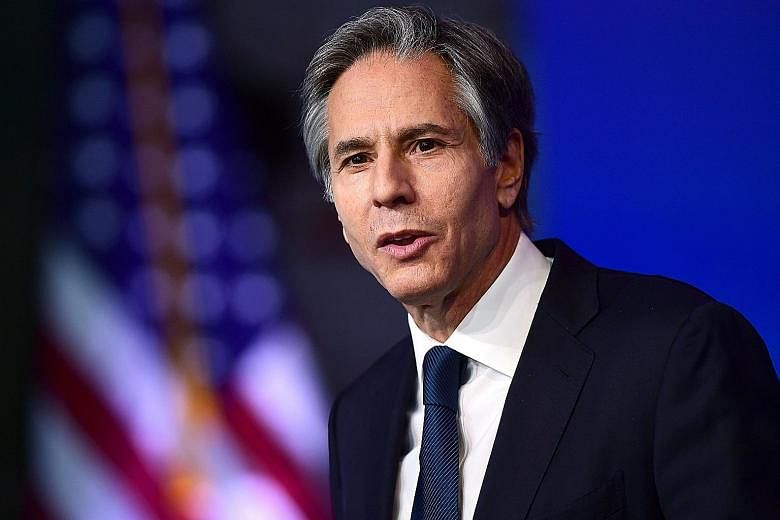WASHINGTON • The US Senate has confirmed Mr Antony Blinken as the country's 71st Secretary of State, installing President Joe Biden's longtime adviser with a mission to rejoin alliances that were fractured after four years of an "America First" foreign policy.
A centrist with an interventionist streak, Mr Blinken was approved by a vote of 78-22, a signal that senators were eager to move past the Trump administration's confrontational approach to diplomacy.
"Blinken is the right person to reassure America's prerogatives on the global stage," Senator Chuck Schumer, the Democrat Majority Leader, said before the vote.
"This is the person for the job," said Senator Jim Risch, the top Republican on the Foreign Relations Committee.
Mr Blinken is the latest of President Biden's national security team to be confirmed, following Director of National Intelligence Avril Haines and Defence Secretary Lloyd Austin.
Mr Blinken, 58, inherits a State Department that he said had suffered from low morale and a workforce of about 1,000 fewer employees than when he left as its deputy secretary in early 2017.
In his nomination hearing last week, Mr Blinken said his plans to ensure multiculturalism in the diplomatic corps would be "a significant measure of whether I succeeded or failed, however long I'm in the job".
Mr Blinken's close relationship with Mr Biden will reassure foreign counterparts that he speaks for the President and US policy.
Mr Donald Trump's first secretary of state Rex Tillerson lost credibility with the White House just months after taking office. He and former secretary of state Mike Pompeo sometimes found themselves undercut by Mr Trump's penchant for tweeting changes in US policy.
Beyond the nation's borders, it will be Mr Blinken's ability to coalesce sceptical allies and manage a range of adversaries that will be the true test of his influence.
His past roles at the centre of Mr Barack Obama's blunders in Syria, Iraq and Libya also remain a sticking point for his critics.
Minutes before Tuesday's vote, Republican Senator Rand Paul made a lone speech to oppose Mr Blinken, blaming him for helping draw the United States into conflicts in Libya in 2011 and Syria in 2014 that have fuelled regional chaos and instability.
"When we had the Obama administration, with Blinken and other military interventionists, we got more war," Mr Paul said. He added that Mr Blinken had failed at his confirmation hearing to assure senators "that regime change is wrong".
In one of the most divisive policy decisions on his horizon, Mr Blinken has already described a measured willingness to rejoin other world powers in a 2015 agreement to limit Iran's nuclear programme, from which the Trump administration withdrew in 2018.
He has promised a harder line against Russia than Mr Trump was willing to take, and will review American policy towards North Korea, which he described at the Senate hearing "as a problem that has not gotten better; in fact, it's gotten worse".
Mr Blinken intends to keep the tougher tone that Mr Trump struck against China - an overarching strategy the Biden administration will wield either to confront Beijing on human rights abuses and military aggressions, or to compete against China in Africa, Europe and the Indo-Pacific.
"I disagree, very much, with the way that he went about it in a number of areas, but the basic principle was the right one," Mr Blinken told senators last week, referring to Mr Trump's approach towards China. "And I think that's actually helpful to our foreign policy."
He also called the Abraham Accords - agreements the Trump administration helped broker to achieve warmer relations between Israel and Bahrain, Morocco, Sudan and the United Arab Emirates - a good thing. However, he said, some of the incentives that were offered to the four states to improve ties with Israel merited a hard look. Among them are benefits that defy international norms, such as recognising Morocco's sovereignty over the Western Sahara.
Some of the policies that Mr Blinken is now reviewing are decisions that were issued in the final days of the Trump administration and were "clearly designed to box in" Mr Biden, said former career diplomat Anne Patterson.
Mr Blinken "has to reverse some of these", said Ms Patterson, an ambassador during the Obama and George W. Bush administrations.
NYTIMES, BLOOMBERG

